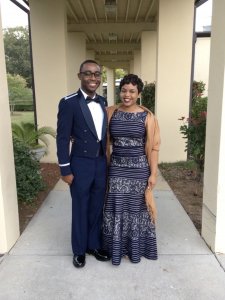Air Force spouse Jennifer Brantley was sitting at her desk earlier this year when her superintendent came by and hustled her over to the public affairs office to take a photo. A few hours later, he returned and said, “You won the NAACP Roy Wilkins Renown Service Award for the 48th Fighter Wing.”
Brantley, a DOD/USAF employee, doesn’t shy away from speaking out against social injustice and racism. Her courage, passion, and actions fall right in line with Roy Wilkins’ work and what he was determined to see come from it.
Roy Wilkins’ legacy
Roy Wilkins was a civil rights activist who played an essential role in the movement between the 1930s and 1970s. He was the assistant NAACP secretary and later replaced W.E.B. Du Bois as editor of their magazine, The Crisis. Wilkins used his position to fight for legislative reform and, during his time, worked with five different presidents. This civil rights award was created in his honor in 1980 to “recognize accomplishments of members of the workforce who support civil rights in the armed services and civilian workforce.”

The award
The annual award recognizes outstanding accomplishments of members of the workforce who support civil rights in the armed services and civilian workforce. Specifically, it recognizes a nominee who displays exceptional character and serves as an outstanding leader, role model, or mentor by promoting the development or advancement of all personnel.
Award in action
Brantley has done just that in her support of civil rights. She said, after the murder of George Floyd, there’s been a shift in her work environment.
“During a sanctioned Operation Grit discussion on race and discrimination, my determination not to shy away from the subject turned a conversation that was mostly silence into an actual discussion of the issues and what it’s like, as a minority, to have to report to work following a collective trauma and watch everyone skirt around events as though nothing happened,” she said.
Brantley joins a long line of award recipients who have decided to use their voice to combat systemic racism. She says she’s been able to have an open dialogue with her non-minority colleagues about how to broach sensitive topics with people of color in an appropriate manner and made it easier for other minorities to speak up.
Since the 2020 summer of protesting and worldwide outcries for justice, the DOD Board of Diversity and Inclusion has taken steps to implement changes to the military system. These changes will allow for more diversity, inclusion, equality, and accountability.
Healing and reconciliation
Brantley says that healing and reconciliation are necessary across the country.
“It cannot come if we continue to be silent and/or expect other people to mute their truth. So I speak. I speak on social media, I speak in person, and I speak on the Discardt podcast. I host events, and I create things like the FindMe Mobile app to help bridge the gap caused by systemic racism and encourage and bring together others in the broader community.”
And she is not alone. Brantley commends others who use their platforms to call out injustice. She says that bridging the divide in our country should start in our communities. This is where leaders and government can best focus on the changes that need to happen.
“If something is important to you, speak on it,” Brantley said.
“If speaking isn’t your thing, there are so many other ways you can contribute to your cause. And by sharing your experience/passion, you may just give someone else the courage to do the same thing.”







































